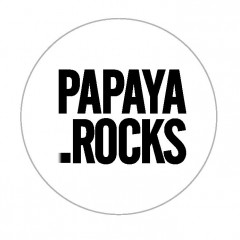16 years old transgender artist portrayed by Marysia Makowska in her short film "Nova"29.06.2020
Nova Stanley was born a girl. Today, as a 16-year-old artist from Brooklyn, he wants to re-define the binary world. He is an illustrator and a musician, but also calls himself "soft activist" – he wants to educate and help people understand what "transgender" and "non-binary" means. We talked to him about his creative process, experiences, role models and symbolic transition which he is undergoing in short film Nova – directed by Marysia Makowska represented by Papaya Films.
How do you see yourself?
I’m Nova Stanley. I’m sixteen. I’m a transgender visual artist and a musician. I’m trying to change the conversation around transgender people. I’m ready for the world to change. I’m just doing my little part, which is educating the people around me.
What is your mission?
To make a difference for kids like me. I'm excited for people to see this film and for trans youth to be noticed by whoever's watching it. And make them think and remember that not everyone is “normal”, cause it’s easy to forget.
Are there a lot of people trying to make a difference right now?
No, there are not. But the few who do talk about people like me, and the ones standing up for transgender kids and adults, are the ones that matter.
Why do you think there aren't that many role models in the world right now?
I think that people don’t like seeing kids who innovate and change and kids who know who they are before the adults do.
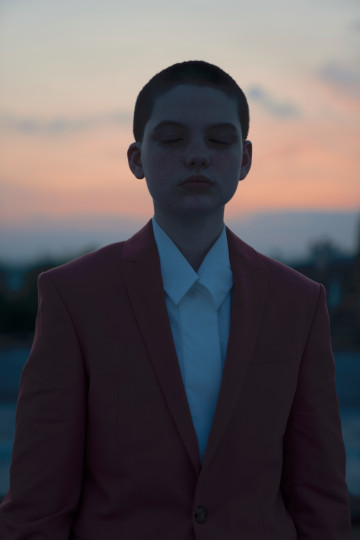
Do you want to be an artist because it can serve as an instrument to create change?
I want to be an artist to help others and help myself. Art for me is also about storytelling. When I grow up, I would love to work as a storyboard artist, or illustrator of books for both kids and adults. I think one of the most impactful things about a piece of art is whether it communicates something. I’ve been very fortunate to have my art featured in children's stories and art books at my young age, and I’m excited to improve and grow my career!
It's exhausting to hear other people tell me how hard it is for them, me coming out. It’s not that big of a difference. People make it out as if they’re the ones who are struggling in this situation.
Do you have a lot of friends who are like you?
Yes, I do, which is a great community for me to have, both in school and in my friend group. And then I have some friends who aren’t like me. They're slowly understanding what it's like to be me, through pieces of my life that I share with them.
Do you have to explain yourself to people?
I do. Very often. I used to identify as nonbinary and I’d have to explain a lot, cause people would be like: “What does that even mean?”. Now I often have to explain myself to people I just met who can be insensitive. Or to people who I've known for a very long time, especially older relatives and older friends–I have to do a lot more explaining about me transitioning and who I'm going to become, what that entails, and how they can treat me with respect and support me through the process. It's exhausting to hear other people tell me how hard it is for them, me coming out. “It’s just so hard, I don’t know what to call you” and I reply: “My name is still the same, just call me Nova”. It’s not that big of a difference. People make it out as if they’re the ones who are struggling in this situation.
If you see a dog in the street that you like and you go: “Who’s a good boy?”, and the owner says: it’s actually a girl–you immediately correct yourself. But when it’s a human being, it suddenly becomes very different. It is so interesting when I say: “I'm actually not a girl” and they continue to call me a girl like 15 minutes later and say: “Oh sorry, it's just really hard.”
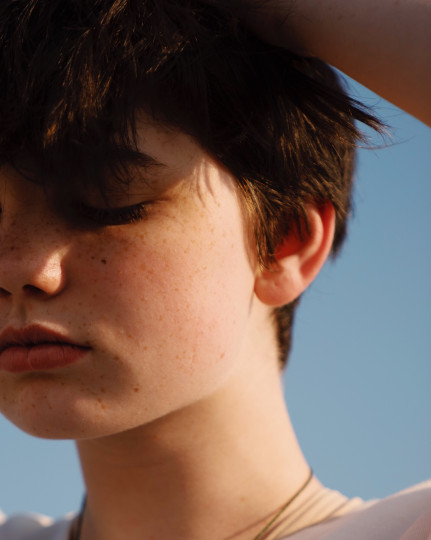
Maybe it’s because people need labels?
But I'm giving them a label. I'm giving them a label that they don't like hearing. I think that people would have to adjust to it… They will have to adjust to it because of me (laughs). It would be so much more helpful if there was more talk about what it’s like to be transgender that isn't a political agenda featured in the media or the general public. It’s something that no one wants to hear about because it makes people uncomfortable.
What about you as a musician, how do you define your musical style?
I’m still very new. I did classical violin for 10 years. I am just really trying to figure myself out as I do it. I'm so self-conscious, I have really bad performance anxiety which is also a reason why I stopped doing violin because I just couldn't handle the stage fright. I don’t mind talking in front of a lot of people, but singing and playing music come with a special vulnerability that is so nerve-wracking to me.
Many transgender individuals have dysphoria. Its this feeling of unease that transgender people feel when they feel they’re living as the wrong gender or in the wrong body.
And when you are in front of the camera?
I was in front of the camera since I was really young, because of my dad. I did my first large-scale film project when I was six or seven and then a couple of years later I did an indie film for a close friend, so I’ve been in front of the camera quite a lot and it's something that I've just gotten used to. My dad would say: “Sit here, stay there, it's a really cool shot!” (Nova’s dad –Theo Stanley– is a cinematographer and a director). Being filmed all the time is something that you have to be comfortable within my family.
At the shoot, was it a spontaneous decision to go full shave?
Yeah, it was. I’ve never done that before. It was liberating in a sense that I didn’t know what it looked like. I didn't see myself until like 30 minutes after. I shaved my head and we kept the shoot going, so I didn’t know how I looked. And then I looked in the mirror and I thought I looked like Eleven from “Stranger Things”, but really bloated, and I freaked myself out. It was very, very short! I wore a hat for the first two weeks. Now I’m so much more comfortable with it, and I’m letting it grow out, and when it gets too long or uncomfortable or, especially, dysphoric–then I'll cut it again.
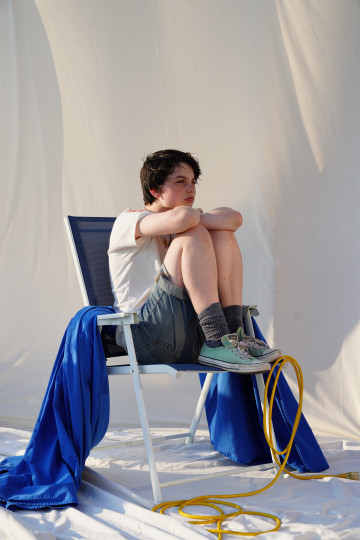
What is “dysphoric’?
Many transgender individuals have dysphoria. Its this feeling of unease that transgender people feel when they feel they’re living as the wrong gender or in the wrong body. I feel like I look like a girl. I deal with it every day. I can help it by making myself look more masculine. So if my hair gets too long and I start to look too feminine for myself, I can cut it off. I play around. My skater friends all have long hair and I’m thinking: “I want that!”, but at the same time I don’t want to look like a girl.
I always think I look like a girl. It sucks. I think the experience of dysphoria is very different from person to person. Female transitioning to male versus male transitioning to female–it’s very different. I personally struggle with my face shape, which is why I freaked out a little when I had to shave because I could see the whole shape of my head, I thought: “I’m so round!”. Also, I have voice dysphoria. I struggle with how my voice sounds, I think it’s so high-pitched. Most female to male persons have chest dysphoria, so I wear a binder. I'm very lucky that I am tall. I have friends who are also transgender and they’re short, and it's rough, because there are not many boys who are 5ft 2in, and they can't do anything about it. They got to live with it, wear platforms sometimes to make themselves taller.
I'm lucky to be in a family that will support me as much as possible. Once I'm 18 and I move out I will be able to do testosterone, which is hormone replacement therapy, but I can't do that right now. It will change my voice and my head shape; it also changes how the body fat is distributed and makes muscle growth easier. Yeah, someday I’ll do that.
“Is discrimination constitutional?” Why are we even discussing this?
What does “becoming” mean to you?
Being raised a girl, I still have bits and pieces of both. I have a lot of fear that comes with being in public and being a woman so when I'm walking home at night I keep my keys in my hand and then I realize that I don’t need to do that because I look like a guy and no one's going to kidnap me. My friends are 50/50: friends who are guys and friends who are girls and I can help my girl friends because I understand what it's like living and feeling the way that they feel, it’s easy for us to communicate and empathize with each other. And for the guy friends, I'm just a sensitive guy, and if they have any issues I'm able to help them with my sensitivity. It works well both ways.
I was walking down the street and this guy was walking past me and I got really scared and I thought to myself “If he catcalls you, just keep on walking, don't make eye contact”, and then he passed by me and said: “Hey”, like a guy to another guy. And I realized that I don’t have to be scared of catcalling. Because of these experiences, I know how to avoid making girls uncomfortable, as a guy.
What are your thoughts on the experiences of the transgender community?
It takes such awful circumstances for the transgender stories to be told. Black trans women are systematically murdered, there are over 20 killed so far this year, it’s insane. It’s an epidemic. The amount of violence and hate crimes against black trans women is disgusting. And right now there’s a Supreme Court case about a transgender woman who was fired from her job because she told everyone that she was transgender. They’re debating whether it was constitutional or not to fire her, which is ridiculous that it’s even a debate. “Is discrimination constitutional?” Why are we even discussing this? She was not making anyone uncomfortable. She was just doing her job.
Most young trans people who talk about being trans are trans women, so male transitioning to female. Most historic trans activists were trans women, like Marsha P. Johnson and Sylvia Rivera. Trans men (women transitioning to men) got much less exposure, they go under the radar more often. Females transitioning to men often blend in better, their transition goes smoother and they’re not targeted as much, because men don't really want to hurt them, and females don’t want to hurt them either.
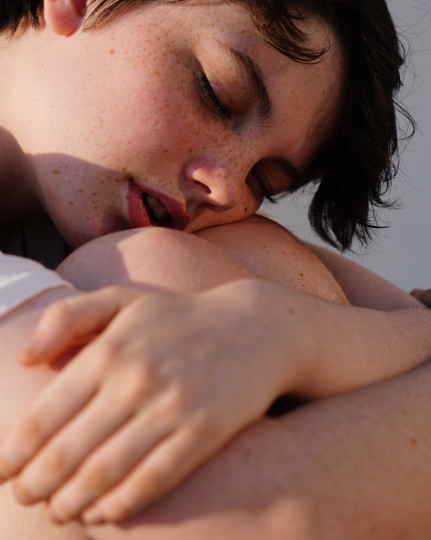
It’s tricky though because there are–I'm guessing–very specific things that you deal with and there's no one who has pioneered them and really celebrated them?
The online community is more female to male than male to female. We hear more about trans women in media, but personally, I mostly hear from trans men on social media, YouTube, etc...
When did you realize that this is the moment to announce your true self?
I don't know if it was one big moment. It was a lot of little things throughout the entirety of my childhood that built up to the point where I felt uncomfortable being who I was and wanted to transform.
Credits:
Starring - Nova Stanley, as himself
Director - Marysia Makowska
Director of Photography - Todd A Somodevilla
Words - Mikio Bradley
Casting Director - Kate Antognini
Stylist - Christopher Quarterman
Barber - Areal Payano
Colorist - David Muessig at Spang.TV
Original score - “Death Song” by Nova Stanley
Special thanks to: Theo Stanley, Cynthia Stanley, Mel Cox and Jordan Rodericks, Bohdan Piasecki
see also
- Papaya Rocks Film Festival – submissions close in one week
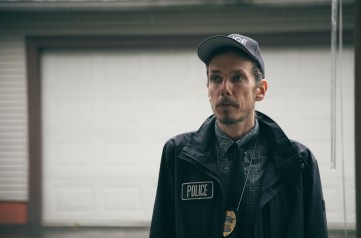 Papaya Rocks Film Festival
Papaya Rocks Film FestivalNews
Papaya Rocks Film Festival – submissions close in one week
- Flying a Drone Inside a Bowling Alley. See the Masterful FPV Video
News
Flying a Drone Inside a Bowling Alley. See the Masterful FPV Video
- “We love watching disasters… as long as they do not happen to us”: An Interview with David Thomson
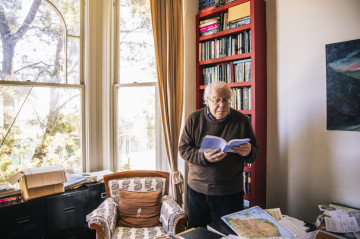
People
“We love watching disasters… as long as they do not happen to us”: An Interview with David Thomson
- Papaya Rocks Film Festival 2021—nominees
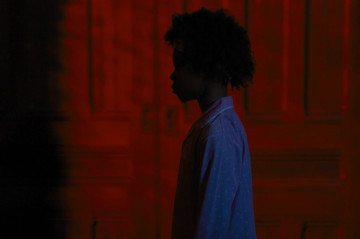 Papaya Rocks Film Festival
Papaya Rocks Film FestivalNews
Papaya Rocks Film Festival 2021—nominees
discover playlists
-
Papaya Young Directors top 15
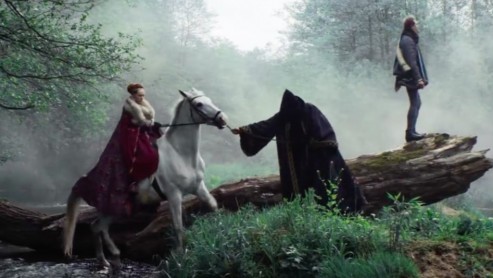 15
15Papaya Young Directors top 15
-
Papaya Films Presents Stories
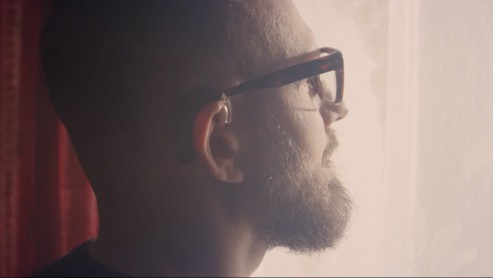 03
03Papaya Films Presents Stories
-
Domowe koncerty Global Citizen One World: Together at Home
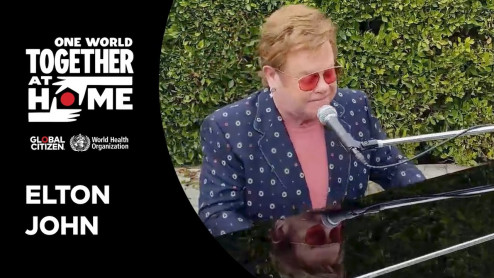 13
13Domowe koncerty Global Citizen One World: Together at Home
-
Walker Dialogues and Film Retrospectives: The First Thirty Years
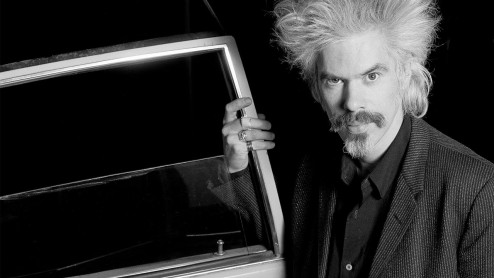 12
12Walker Dialogues and Film Retrospectives: The First Thirty Years
